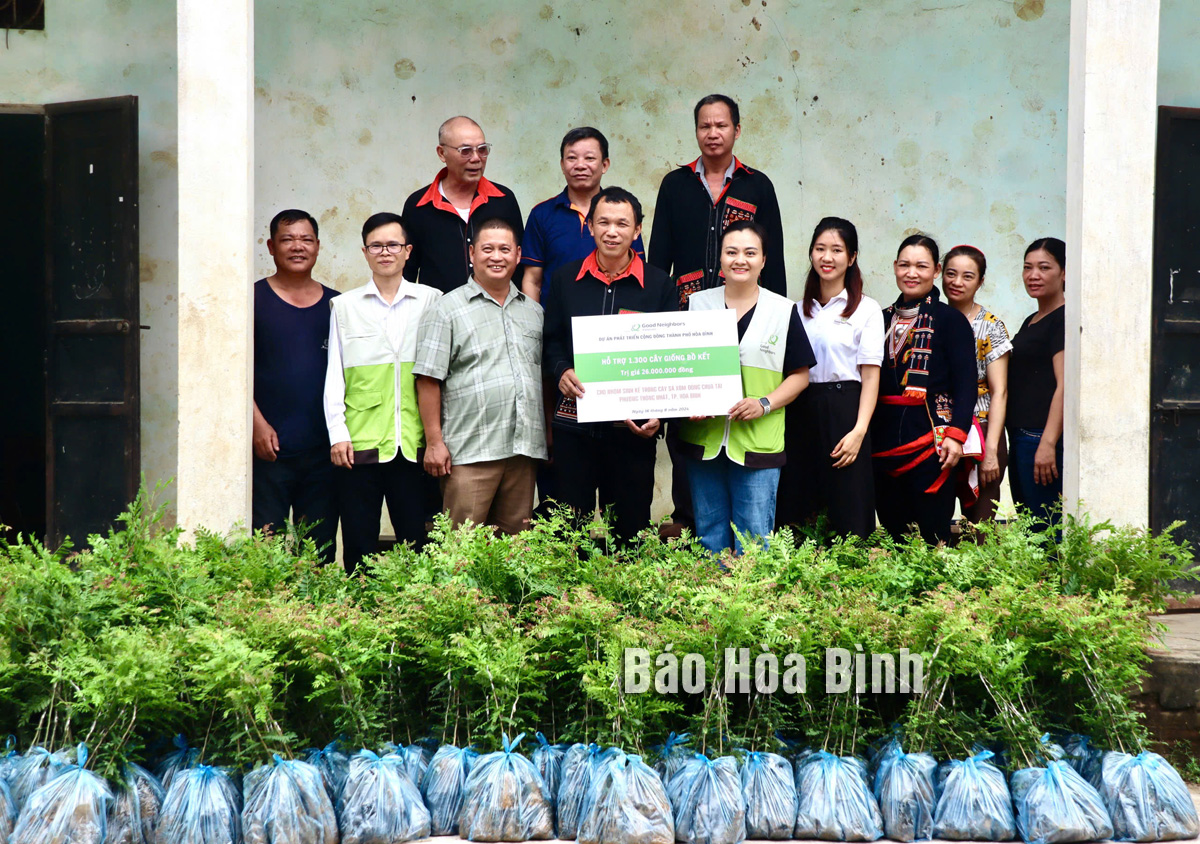
On August 16th, the Community Development Project in Hoa Binh City, under the Good Neighbors International (GNI) Organization, provided 1,300 soapberry seedlings to the Lemongrass Farming Group in Dong Chua Hamlet, Thong Nhat Ward, Hoa Binh City.

The representatives of the GNI
Organization handed over the support to the Lemongrass Farming Group in Dong
Chua Hamlet, Thong Nhat Ward, Hoa Binh City.
The
Lemongrass Farming Group in Dong Chua Hamlet was established with GNI's support
in 2017, comprising 15 member households of Dao ethnic group. Since its
inception, the group has received the support amounting to 400 million VND,
including revolving funds for members and the production equipment such as 5
grass-cutting machines and 13,000 meters of irrigation pipes…
The
group currently cultivates around 30 hectares of lemongrass, each hectare
yields 7-10 tons of roots annually. The group’s total annual production of
lemongrass roots exceeds 200 tons, giving each household an income of 70-80
million VND annually. Lemongrass is a crop that requires little care, allowing
the employees more idle time during the off-season. However, it is grown on
hills and slopes where water retention is challenging due to shallow root
systems. Additionally, the soil used for lemongrass cultivation over time can
become calcified, reducing yield.
To
solve this issue, the group has developed a solution to improve the soil
conditions and expand the market opportunities by intercropping soapberry trees
with lemongrass. Recognizing that it is a sustainable development solution, the
GNI Organization has supported 80% of the value of 1,300 soapberry seedlings,
equivalent to 26 million VND, for the Lemongrass Farming Group in Dong Chua
Hamlet.
According to data from the Hoa Binh Provincial Party Committee, the industrial production index for the first six months of 2025 is estimated to have increased by 20% compared to the same period last year. This marks the highest year-on-year growth rate for this period since 2020.
In the first six months of 2025, Hoa Binh province’s export turnover was estimated at 1.145 billion USD, marking an 18.11% increase compared to the same period in 2024. Import turnover was estimated at $ 804 million, a 17.15% increase, which helped the province maintain a positive trade balance.
The lives of the ethnic minority farmers in Tan Lac district have gradually improved thanks to the new directions in agricultural production. This is a testament to the collective strength fostered through the professional associations and groups implemented by various levels of the district’s Farmers’ Union.
With the motto the "product quality comes first,” after nearly one year of establishment and operation, Muong village’s Clean Food Agricultural and Commercial Cooperative, located in Cau Hamlet, Hung Son Commune (Kim Boi district), has launched reputable, high-quality agricultural products to the market that are well-received by consumers. The products such as Muong village’s pork sausage, salt-cured chicken, and salt-cured pork hocks have gradually carved out a place in the market and they are on the path to obtaining the OCOP certification.
In the past, the phrase "bumper harvest, rock-bottom prices" was a familiar refrain for Vietnamese farmers engaged in fragmented, small-scale agriculture. But today, a new spirit is emerging across rural areas of Hoa Binh province - one of collaboration, organisation, and collective economic models that provide a stable foundation for production.
Maintaining growing area codes and packing facility codes in accordance with regulations is a mandatory requirement for agricultural products to be eligible for export. Recently, the Department of Agriculture and Environment of Hoa Binh province has intensified technical supervision of designated farming areas and packing facilities to safeguard the "green passport" that enables its products to access international markets.



